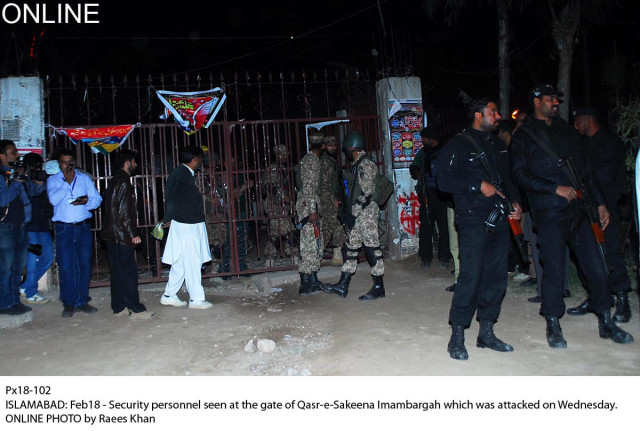The Washington follies
The minister was right to be embarrassed when he admitted that govt doesn't have complete data on banned organisations

There is broad support among sections of the Pakistani population for sectarian organisations that operate in the country under whatever guise. PHOTO: ONLINE

There is a tragic irony to the attack in Islamabad because on the same day that it happened, Interior Minister Chaudhry Nisar spoke at a conference in Washington, DC. The conference had been convened by US President Barack Obama in the wake of the attack on the Charlie Hebdo offices in Paris, and was designed to bring together a collection of states and their representatives to examine ways in which extremism can be countered, eradicated, and prevented from occurring in the first place. The interior minister spoke of the sea change in the mindset of Pakistan and its people after the attack on the Army Public School (APS) in Peshawar on December 16, 2014. Perhaps, inevitably, he likened it to the 9/11 attacks and said that the attack had brought together all elements of society on to a single platform and united in their desire to defeat the terrorists. This assertion stands open to scrutiny as evidenced by the attack in Islamabad. There is broad support among sections of the Pakistani population for sectarian organisations that operate in the country under whatever guise. Sectarian groups have supporters numbering in the many millions, and they will most certainly not be sharing a platform that exists in the minds of those currently struggling to implement the National Action Plan (NAP).
The interior minister was directly questioned about the sectarian issue, and he said he was embarrassed to admit that his government did not possess complete data on banned or proscribed organisations, such as the Jamaatud Dawa (JuD) and the Lashkar-e-Taiba (LeT), saying that they remade themselves and that created difficulties in taking action against them — which rather begs the question as to what our intelligence and security agencies are doing if not gathering data on the very groups the government has banned. There is “no tangible record” of the exact number of proscribed organisations, said our interior minister — an admission of breathtaking and willful failure not only of this government but its predecessors as well.
The interior minister was right to be embarrassed, and he managed to create further embarrassment for himself by saying that the Islamic State (IS) had no presence in Pakistan. There is ample evidence from every province that the IS has supporters; there are almost daily reports of wall chalking and of IS literature being circulated in Peshawar and elsewhere. Thus far there has not been an operation or attack that has been claimed by the IS, but it is only a matter of time before there is. The latency of the IS links directly to the sectarian issue, and is currently the lead accident-waiting-to-happen. “The IS exists only in the Middle East.” In your dreams, Interior Minister.
It is occasions such as this that expose to the world the true weakness of governance in Pakistan, its serial incompetence and the underlying reasons why Pakistan is seen as a proliferator of terrorism, rather than a state that has actively fought against it in a sustained manner. Flawed policies and doctrines — strategic depth, anybody — have produced a set of self-inflicted wounds that are now being treated in the global dressing-station. The interior minister concluded by saying: “It is important for us to learn from our mistakes and from our history.” Here he was absolutely right. Then when may we expect the arrest of the imam of the Lal Masjid in Islamabad? We seek your early reply, Interior Minister.
Published in The Express Tribune, February 20th, 2015.
Like Opinion & Editorial on Facebook, follow @ETOpEd on Twitter to receive all updates on all our daily pieces.















COMMENTS
Comments are moderated and generally will be posted if they are on-topic and not abusive.
For more information, please see our Comments FAQ